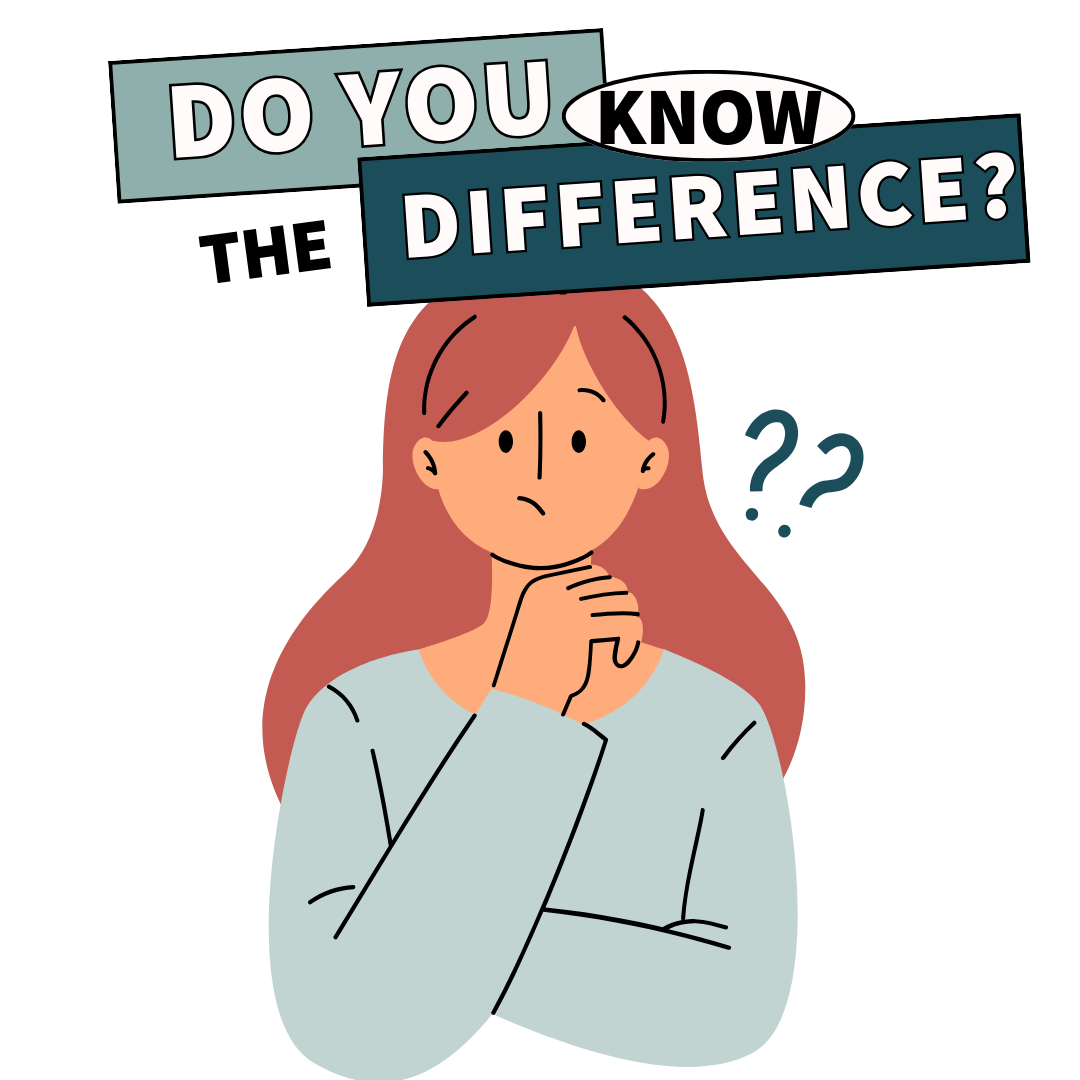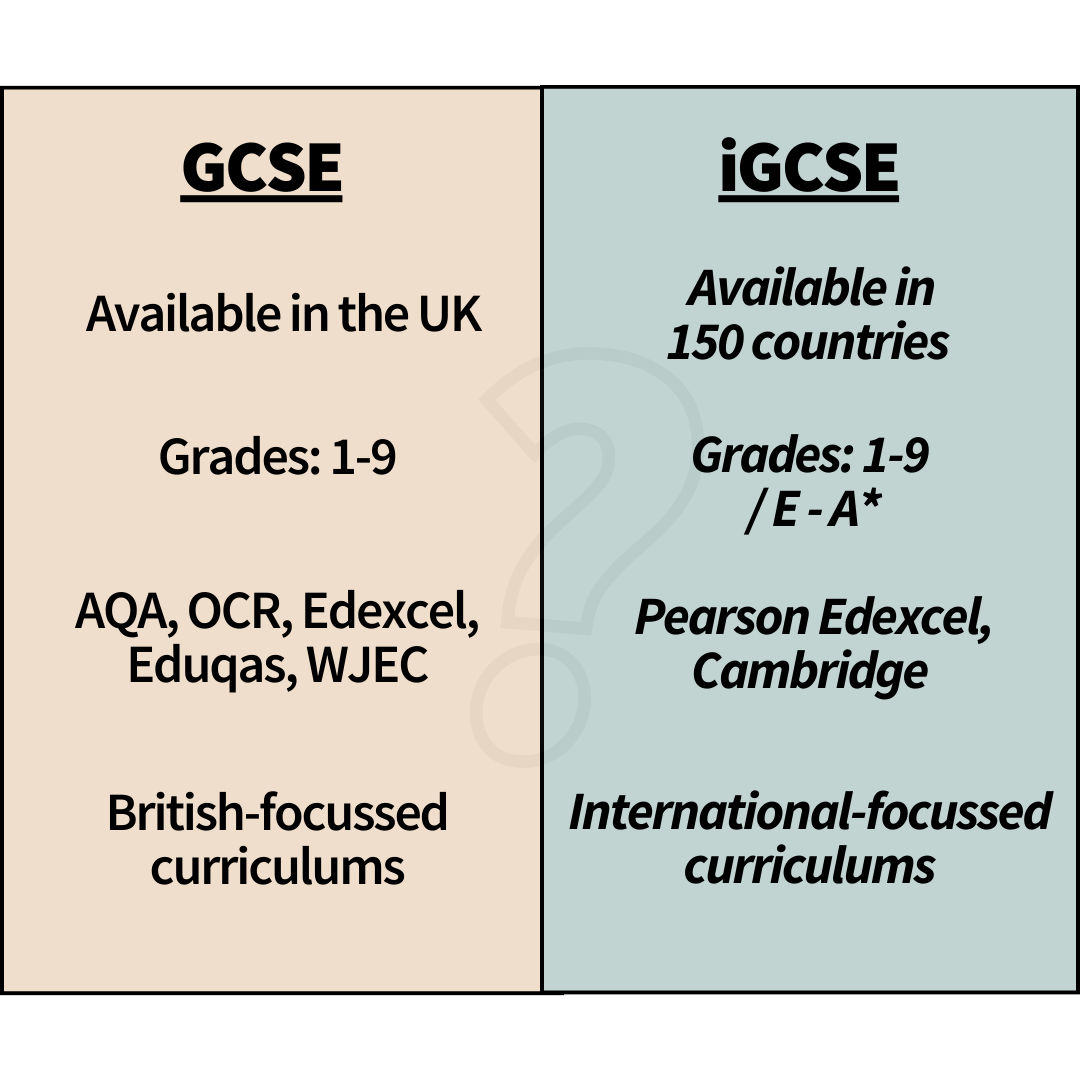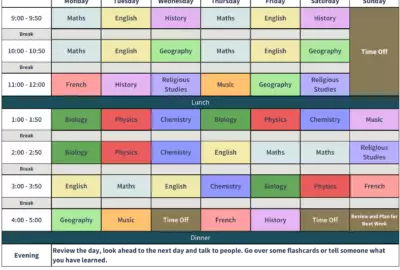
Differences between GCSE and IGCSE
The General Certificate of Secondary Education (GCSE) or international equivalent (IGCSE) exams are traditionally sat at the end of year 11, when pupils are aged 15 to 16. This marks the end of compulsory education in the UK, with most students then going on to study for A Levels or complete an apprenticeship.
The syllabus for these exams is normally taught over 2 years, with this stage of schooling referred to as Key Stage 5. These exams are equivalent to Scottish National 5 Qualifications.
GCSE qualifications in Maths and English are often required for many university and apprenticeship courses. So, what are GCSEs and their international equivalents? Read on to discover the differences in availability, exam season, coursework, grades and more!
Before we begin: Need a GCSE or iGCSE Tutor?
We are experts in providing bespoke online and in-person one-to-one GCSE and IGCSE tutoring in London.
More Information 2.0 TopThe Main Differences
Need further support?
Availability
GCSEs are taught throughout the UK, and while Scotland has its own
secondary qualification system, some schools still opt to teach GCSEs.
GCSEs are offered by the exam boards Pearson EDEXCEL, AQA, OCR, WJEC
and Eduqas. These are monitored by the Office of Qualifications and
Examinations Regulation (Ofqual) to ensure that no student receives any
advantage or disadvantage by taking one exam board over the other.
Some Commonwealth countries also offer GCSEs but in general, the international equivalent (IGCSE) is taught worldwide. The IGCSE is offered by Pearson Edexcel or Cambridge and is recognised by all Higher Education providers (such as universities) as directly equivalent to GCSEs.
Exam Dates
Both GCSE and IGCSE exams are sat in the summer exam season between May and June. Both, offer resits in November, however, IGCSE also offers a January exam season. These dates are in line with the UK school year and are coordinated to ensure that all students can receive their results at the same time.
Coursework Requirements
Historically, IGCSE was structured to be assessed mainly on final examinations rather than including coursework like traditional GCSE subjects. This was to ensure that international students with English as a second language were not disadvantaged. However, with exam reforms in 2017, much GCSE coursework has been scrapped, thus meaning that the differences between GCSE and IGCSE coursework is negligible.
Course Content
The course content for GCSEs and IGCSEs differs because of the “international” focus of the latter. This means that while Shakespeare is compulsory in English literature GCSE, it is an optional part of the IGCSE. Likewise, IGCSE History and Geography have more internationally focused curriculums to ensure that students around the world are not disadvantaged.
While the course content for GCSEs and IGCSEs differs, the goal remains the same: excellence in understanding and application. Explore our Ultimate Guide to GCSE Revision for tips on revising effectively.
Grading System
The grading systems is maybe where stuff gets confusing! In 2017, GCSEs moved away from the classic A*-E system, and moved to 9-1 grading (with 9 being the highest, equivalent to A**). However, Cambridge IGCSE have chosen to continue with the A*-E system whereas, Pearson Edexcel are now using 9-1 grading for their IGCSEs in order to maintain consistency with their GCSE offerings. The important thing to remember in this confusion of letters and numbers is that the equivalency is well established, and universities will not view one system as preferable over the other.
For students aiming for top grades, understanding the differences between GCSE and IGCSE is crucial.
Discover how to achieve all 9s in your GCSE or iGCSE exams.
3.0 Top
What countries offer IGCSEs?
According to the Cambridge International website, over 10,000 schools in more than 160 countries offer Cambridge programmes and qualifications. Please find a partial list below:
| Country | Details |
|---|---|
| Hong Kong | Widely used in international schools. Students can take the Cambridge or Edexcel exam boards either at school or through the Hong Kong Examinations and Assessment Authority (HKEAA). |
| Macao | Used in schools where the medium of instruction is English and the IGCSE curriculum is adopted. Students in some international schools can take the Cambridge or Edexcel exam boards. |
| Singapore | Predominantly used in international schools, with some other schools offering it as an alternative to O Level exams. |
| Malaysia | Predominantly used in international schools, with some other schools offering it as an alternative to O Level exams. |
| United Kingdom | Offered by Edexcel and AQA exam boards. Initially allowed in state-funded schools but removed from official performance tables in 2017. Predominantly taken in private schools. |
| United States | A small number of schools offer the IGCSE, with some homeschooling educators opting for it due to its advanced curriculum. |
| Italy | Several high schools are part of the Cambridge Schools Network and offer IGCSE and AS & A Level certifications. Some universities in Italy accept these qualifications with a minimum grade requirement for admission. |

What are GCSEs?
The first GCSE exams were sat in 1988, replacing the former O Level qualifications. This means they have been sat for more than 30 years - an important reminder to students suffering through exam season, they are not the first! GCSEs are considered to be the national UK high school qualification and minimum grades in Maths and English are required to be admitted to many university courses and apprenticeships. They are often a stepping stone to A Levels or Foundation courses.
Students study the syllabus from year 10, sitting the exams at the end of year 11. In some cases, exams can be sat at the end of year 10. Students sit anywhere between 4 and 11 subjects, with Maths, English Literature, English Language and Sciences being compulsory at most schools. Elective subjects include History, Geography, Philosophy & Ethics, French, Spanish, Italian, Mandarin, Latin etc.
5.0 Top
Is IGCSE Harder Than GCSE?
Fake news! While traditionally IGCSEs were considered to be more difficult, owing to the fact that grades were fully dependent on final assessments, since the 2017 GCSE reforms that eradicated coursework, there is now a negligible difference in the assessment methods of the two. This is one of the main reasons that they are considered equivalent by Higher Education institutions and employers.
6.0 Top
Is IGCSE or GCSE Better?
There is zero difference in terms of the value of your qualification, and the choice might actually be out of your hands. The qualification type is often dependent on location (see that list of countries above) or based on the syllabus preference of a school department. To reiterate – since the 2017 GCSE reforms - the difference in assessment style is negligible.
7.0 Top
FAQs
The main differences lie in their availability, with GCSE primarily available in the UK, while IGCSE is offered in over 150 countries worldwide. Additionally, there are differences in exam dates, coursework requirements, course content, and grading systems.
Yes, both GCSEs and IGCSEs are considered equivalent qualifications, recognized by Higher Education providers globally.
Both GCSE and IGCSE offer a range of subjects including Maths, English Literature, English Language, Sciences, History, Geography, Philosophy & Ethics, and languages such as French, Spanish, Italian, Mandarin, and Latin.
Both qualifications are typically assessed through final examinations, although historically IGCSE placed less emphasis on coursework compared to traditional GCSEs. However, recent reforms have reduced the disparity in coursework requirements.
Yes, students studying outside the UK often have the option to choose between GCSEs and IGCSEs, depending on the availability of these qualifications in their region and the preference of their educational institution.
Universities view both GCSEs and IGCSEs favorably, considering them as equivalent qualifications for admission purposes.
The advantages may vary depending on individual circumstances such as future study plans, career goals, and the international recognition of IGCSEs. However, both qualifications are highly regarded and offer similar preparation for further study or employment.
The choice between GCSEs and IGCSEs may depend on factors such as location, school curriculum preferences, and personal considerations. However, both qualifications are considered equally valuable.
The requirements for taking GCSEs or IGCSEs may vary depending on the educational institution and country. However, typically students enroll in these qualifications during their secondary education, usually around the ages of 14-16.
8.0 Top
Conclusion
At the end of the day, the differences between GCSEs and IGCSEs are primarily related to location and grading system. Both qualifications are designed to prepare you well for further study or employment and are equally respected. They are assessed in similar ways, following similar timelines, ensuring that you won’t be disadvantaged by choosing one over the other.
The choice between GCSE and IGCSE is often determined by your school and the preferences of individual departments, with some schools offering different exam boards for different subjects.
Whether you opt for GCSE or IGCSE, the key to success lies in effective preparation and understanding the nuances of each syllabus. If you're looking to excel in your exams and gain a deeper understanding of these qualifications, explore our GCSE and IGCSE private tuition. Our expert tutors are dedicated to helping you achieve your academic goals, whether you're diving into Shakespeare or mastering mathematical concepts.
Other Articles

What are IGCSEs?

GCSE Maths Exams Explained

Free GCSE Revision Timetable Template

How to Revise GCSE Maths

The Ultimate Guide to GCSE Revision

How to Get All 9s in your GCSEs?

How to Revise for English Literature GCSE
As featured in











